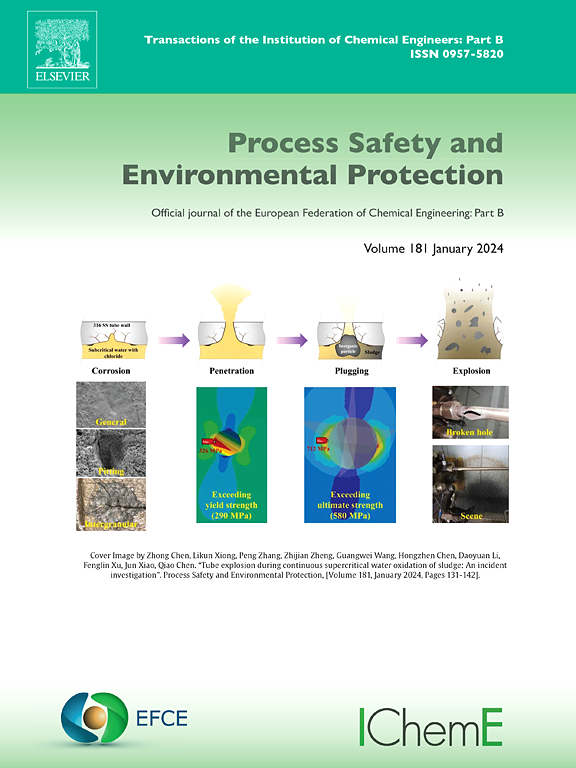水电解系统的风险评估框架:将系统理论过程分析和事件树分析映射到模糊贝叶斯网络(FBN)
IF 6.9
2区 环境科学与生态学
Q1 ENGINEERING, CHEMICAL
引用次数: 0
摘要
风险评估在促进绿色制氢的安全性和可持续性方面发挥着至关重要的作用。本研究提出了一种结合系统理论过程分析法(STPA)和事件树分析法(ETA)的因果定性分析和定量分析方法(FBN)的风险评估方法。在灵活调整典型 STPA 分析流程的基础上,建立了以氢泄漏为关键事件的基于 STPA-ETA 的 BN 拓扑。它体现了系统性、模块化和可理解性。采用模糊集合理论(FST)和专家判断来解决无法获得概率的问题。预测分析结果表明,氢泄漏的概率为 12.63%。诊断分析能够评估事件对氢泄漏事故的影响,评级因素包括泵故障、流量控制阀故障、氢脆、阀组操作风险和管理风险以及环境因素。后果分析表明,及时的手动紧急关闭屏障在防止事故升级方面起着至关重要的作用。最后,针对目前 BN 中灵敏度分析方法的多样性,文章总结了六种灵敏度分析方法,并深入探讨了它们之间的相互关系。发现了两类敏感性分析维度。本研究的结果为 PEMWE 系统的风险评估、事故预防和应急管理提供了有价值的见解。此外,本研究提出的框架还可扩展到其他可靠性分析领域。本文章由计算机程序翻译,如有差异,请以英文原文为准。
A risk assessment framework for water electrolysis systems: Mapping System Theoretic Process Analysis (STPA) and Event Tree Analysis (ETA) into Fuzzy Bayesian Networks (FBN)
Risk assessment plays a vital role in facilitating the safety and sustainability of green hydrogen production. This study presents a risk assessment method incorporating causal qualitative analysis of System Theoretic Process Analysis (STPA) and Event Tree Analysis (ETA), and quantitative analysis of FBN. Based on the flexible adaptation of the typical STPA analysis process, the topology of STPA-ETA-based BN with hydrogen leakage as the critical event is established. It shows systematization, modularity and comprehensibility. The fuzzy Set Theory (FST) and expert judgment were adopted to solve the problem of inaccessible probabilities. The results of the prediction analysis indicate that the probability of hydrogen leakage is 12.63 %. The diagnostic analysis is capable of assessing the event's contribution to the hydrogen leakage accident, rating factors such as pump failures, flow control valve failures, hydrogen embrittlement, valve group manipulation risks and management risks, and environmental factors. The consequence analysis indicates that a timely manual emergency shutdown barrier plays a vital role in preventing the escalation of incidents. Finally, addressing the current diversity of sensitivity analysis methods in BN, the article summarizes six sensitivity analysis methods and explores their interrelationships in depth. Two categories of sensitivity analysis dimensions were found. The results of this study provide valuable insights for risk assessment, incident prevention, and emergency management in the PEMWE system. Also, the framework proposed in this study can be extended to other areas of reliability analysis.
求助全文
通过发布文献求助,成功后即可免费获取论文全文。
去求助
来源期刊

Process Safety and Environmental Protection
环境科学-工程:化工
CiteScore
11.40
自引率
15.40%
发文量
929
审稿时长
8.0 months
期刊介绍:
The Process Safety and Environmental Protection (PSEP) journal is a leading international publication that focuses on the publication of high-quality, original research papers in the field of engineering, specifically those related to the safety of industrial processes and environmental protection. The journal encourages submissions that present new developments in safety and environmental aspects, particularly those that show how research findings can be applied in process engineering design and practice.
PSEP is particularly interested in research that brings fresh perspectives to established engineering principles, identifies unsolved problems, or suggests directions for future research. The journal also values contributions that push the boundaries of traditional engineering and welcomes multidisciplinary papers.
PSEP's articles are abstracted and indexed by a range of databases and services, which helps to ensure that the journal's research is accessible and recognized in the academic and professional communities. These databases include ANTE, Chemical Abstracts, Chemical Hazards in Industry, Current Contents, Elsevier Engineering Information database, Pascal Francis, Web of Science, Scopus, Engineering Information Database EnCompass LIT (Elsevier), and INSPEC. This wide coverage facilitates the dissemination of the journal's content to a global audience interested in process safety and environmental engineering.
 求助内容:
求助内容: 应助结果提醒方式:
应助结果提醒方式:


